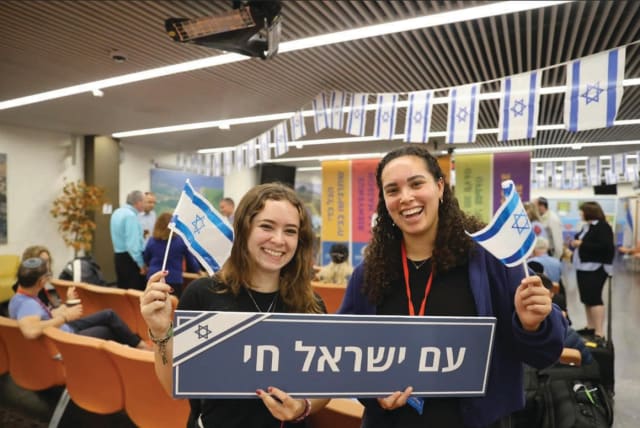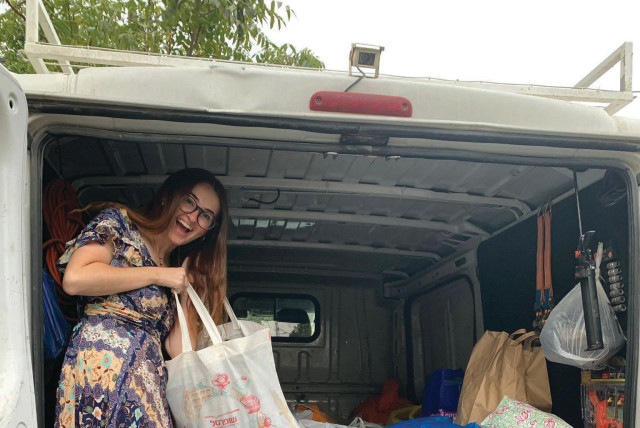Israel-Hamas war: How are thousands of olim helping out?

This includes packing supplies, making challot for Shabbat, helping tutor children whose parents are in the IDF reserves, working on a social media campaign to raise awareness, and more.
When Calanit Epstein, 19, touched down at Ben-Gurion Airport as a new olah, she knew she made the right decision.
Epstein, who made aliyah from Silver Spring, Maryland, in the middle of the Israel-Hamas war, knows she’s arriving at a tense time for Israel, a country in mourning after 1,200 of its civilians were murdered by Hamas and some 200 people were taken hostage.
Epstein was one of 25 olim (new immigrants) who made aliyah with Nefesh B’Nefesh in October, in a flight coordinated in partnership with Israel’s Ministry of Aliyah and Integration, the Jewish Agency for Israel, Keren Kayemeth LeIsrael-Jewish National Fund, and JNF-USA.
Despite the challenges of wartime, Epstein continued with her plans to join Garin Tzabar and enlist in the IDF as a lone soldier because she knows that Israel is where she is meant to be.
“I’ve wanted to make aliyah since I was 12,” she said, adding that she wanted to join the ranks of the IDF not only because it was a direct way to support Israel but also because she knew it would be a way to integrate into society quickly, as she would be compelled to learn Hebrew and rapidly immerse herself in Israeli culture.
“Once the war broke out, I felt that I needed to help more than ever. I don’t know what will happen once I start my service, but I know doing so will help make a difference,” she said. “There are people who donate money, but I don’t have much to give. But this is something I can do.”
She continued, “I’m not so nervous. I think things will work out. It will be difficult, but I know what I’m getting into. Part of being Israeli is understanding that the bad comes with the good. You need to accept it all. You can’t run away whenever things are hard. Our whole history as Jewish people has been hard, so we have to come to terms with the reality of that.”
Thousands of immigrants in Israel drop everything to help out during war
EPSTEIN IS just one of the thousands of olim who have dropped everything to help Israel in wartime.
Before starting her service, Epstein is in Jerusalem carrying out as many acts of hessed (kindness) as possible in order to boost morale on the home front. This includes packing supplies, making challot for Shabbat, helping tutor children whose parents are in the IDF reserves, working on a social media campaign to raise awareness of the situation in Israel, and more.
On the morning of October 7, Susanna Horowitz (21, from Woodmere, New York), Emily Zwiebel (21, from Hewlett, New York), and Meira Eckman (21, from West Hempstead, New York) were enjoying a festive Simchat Torah in Jerusalem – until sirens began permeating the air.
“We went into our bomb shelters, confused. There were three lone soldiers at our meal, and they left immediately,” Zwiebel recalled. “We knew something was wrong, and we waited in silence until the day was over.”
Once the holiday ended and the horrors of what happened that day became known, they immediately sprang into action to see what they could do to help.
“The next day was so hard. We all felt very helpless. We wanted to help but didn’t know how. We saw that there were a lot of things soldiers needed who were suddenly sent to the front lines. Basic necessities, like socks and underwear, were missing,” Horowitz said.
Horowitz joined a group chat in the community, and truck drivers offered to send supplies to army bases.
“We called upon everyone we knew to cook and gather as much materials as we could. We loaded up a big car for soldiers. It was insane how many people came and brought food and necessities. Our apartment was completely packed,” Horowitz said.
Every night, the three National Service volunteers sit around a table and discuss how they’re going to distribute the various donations they receive and how they will leverage their community’s resources and manpower the following day. So far, they’ve raised some $20,000 in donations from the United States.
The women are also part of an app called Civil Power, where people can donate money or their services in various ways. The app, created by a dedicated team of volunteers, provides a simple and friendly interface for people to post requests for help in various areas – financial assistance, toy donations, transportation – while also enabling volunteers to donate their time to carry out these various asks in order to “create deep and meaningful connections within the community.”
“Everyone we encounter wants to help,” Zwiebel marveled, adding that even those working in local markets have reached out to the girls, asking how they can be of assistance.
Marc Rosenberg, vice president of Diaspora Partnerships at Nefesh B’Nefesh, has never been prouder of the community of olim who have enthusiastically stepped up to the plate when needed.
“We’re seeing a lot of activity. You have olim who are caring for their own communities, since many native-born Israelis are being called up for reserve duty. Others are helping soldiers who need basic equipment, and some are even giving up their apartments and Airbnbs for displaced families from southern communities who had to leave their homes.”
Nefesh B’Nefesh is also doing its part to help the war effort by spearheading Operation Hug, an initiative in collaboration with JNF-USA and Friends of the Israel Defense Forces, which will provide hundreds of round-trip airline tickets for one parent or any lone soldier serving in active combat units during the Israel-Hamas war, from anywhere in the world.
The project is a much-needed one, with thousands of parents around the world anxious to be close to their children who are serving Israel during this precarious time. The new emergency fund aims to shorten the distance between these parents and their soldiers and enable them to feel closer to where they are serving. The parents will fly to Israel with El AL, which is generously cooperating with the project.
BATYA COHEN, 45, who made aliyah two years ago from Chicago, is also dedicating time to help.
“There is no place I’d rather be right now, even with everything being crazy,” Cohen said. “One of my kids is in reserves, and another one is on call. But we have so much support, since almost everybody has a kid who is called up. We all understand.”
To do her part, Cohen has volunteered for Grilling for the IDF, a charity that provides barbecue food for soldiers at their bases.
“We spend all day baking, making salads. It’s beautiful,” she said, adding that while her children were out of school, the whole family got involved and spent the day baking and chopping in the kitchen.
“Right now, the only thing I miss about America is Costco and having a bigger oven!” Cohen joked.
“I come from a military family,” she said. “I may not be on the front lines, but I’ve never seen such a mobilization of the civilian army. This community is incredible, and I can’t imagine living anywhere else.”
Rosenberg explained that most olim come here “for practical reasons” but that there’s a powerful ideology as well.
“By helping in such a profound way, it’s clear to them now that they’re part of Israel,” he said.
That’s a sentiment that Epstein can certainly identify with as a new immigrant.
“Some people have a specific reason to make aliyah. For me, it was always chasing the feeling of knowing where I belong,” she said. “When I landed, it was just as the sun began to rise. It was beautiful. It was a new beginning. I can’t wait to start the rest of my life.” ■
Jerusalem Post Store
`; document.getElementById("linkPremium").innerHTML = cont; var divWithLink = document.getElementById("premium-link"); if (divWithLink !== null && divWithLink !== 'undefined') { divWithLink.style.border = "solid 1px #cb0f3e"; divWithLink.style.textAlign = "center"; divWithLink.style.marginBottom = "15px"; divWithLink.style.marginTop = "15px"; divWithLink.style.width = "100%"; divWithLink.style.backgroundColor = "#122952"; divWithLink.style.color = "#ffffff"; divWithLink.style.lineHeight = "1.5"; } } (function (v, i) { });

